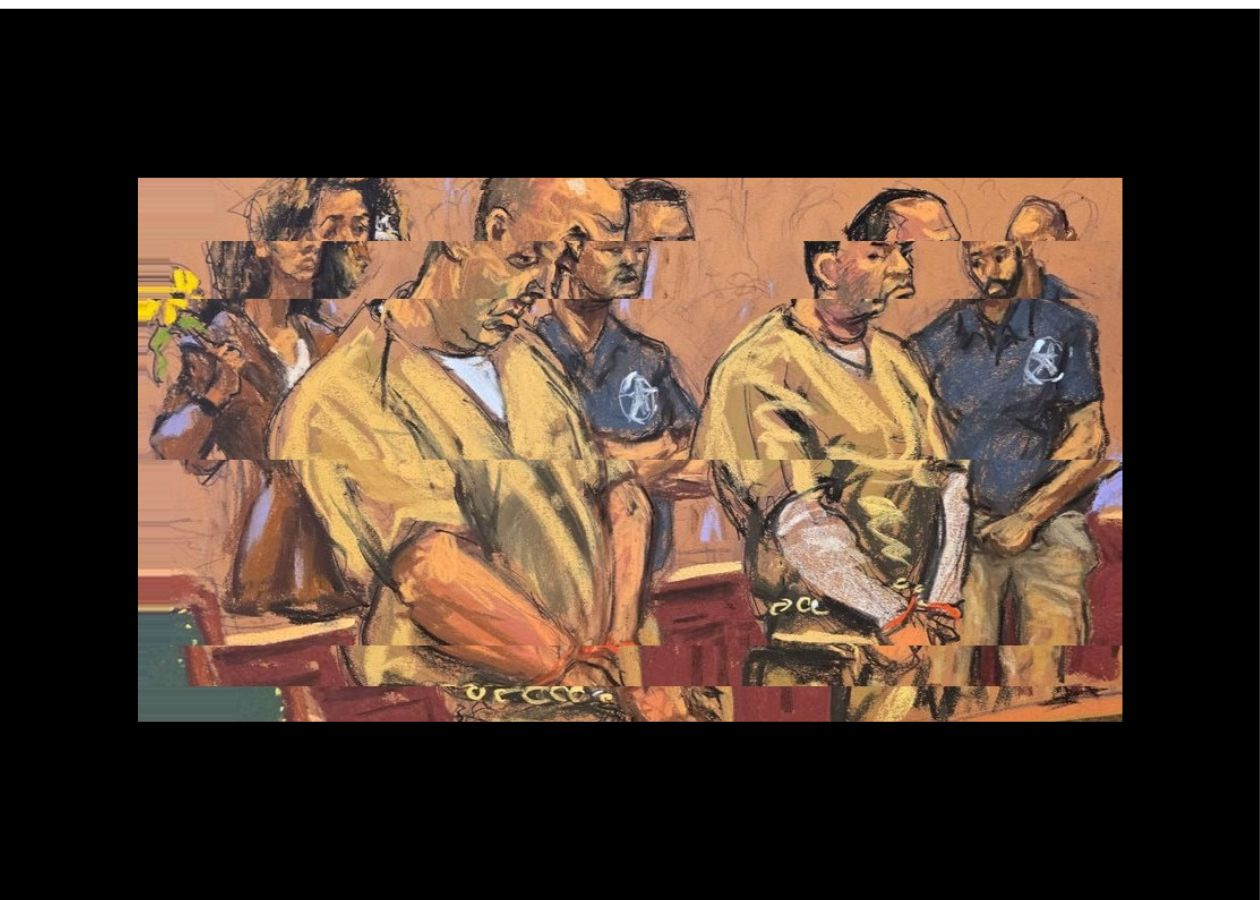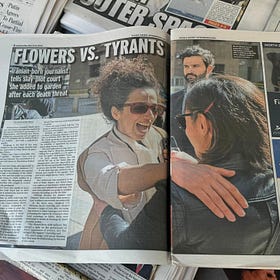‘Dead Woman Walking—and Talking’
Two men hired to kill Masih Alinejad, the activist from Iran, are sentenced to prison.
Jay Nordlinger is a senior resident fellow at the Renew Democracy Initiative and a contributor at The Next Move.
“You know the movie Dead Man Walking? I am Dead Woman Walking—and Talking.” So said Masih Alinejad outside a federal courthouse in Manhattan on Wednesday.
Alinejad is a journalist and human rights activist from Iran. She has been living in exile since 2009. She is now a US citizen. Masih has dodged assassination and kidnapping several times.
I have podcasted with her, and written about her, regularly. For a 2021 profile, go here.
On Wednesday, there was a court hearing to sentence two Russian mobsters hired by the Iranian government to kill Masih. There was a decent media contingent present.
For a New York Times report, go here; for an Associated Press report, here.
Sitting in the courtroom, I jotted some notes, a portion of which I’ll share now.
***
Masih enters with her hair as big and bold as possible, and she wears a striking dress. Some friends inquire about it, and she “models” it for them. It shows a flock of birds, taking off.
Masih is accompanied by her husband, Kambiz Foroohar (who wears a business suit).
***
The courtroom is full of Masih’s well-wishers. One of them is Berta Valle, the wife of Félix Maradiaga, the Nicaraguan democracy leader and former political prisoner. (For a piece I did on Berta and her family, while Félix was in prison, go here.)
There are also several people from the Human Rights Foundation, including its president, Céline Boustani, a human rights lawyer from Lebanon.
My colleague Evan Gottesman, of the Renew Democracy Initiative, is here.
And I find myself sitting next to a lovely woman who comes from England—Coventry, in particular. She is associated with a women’s rights group.
As for Masih, she sits in the second row, on the center aisle.
***
I can’t help thinking, “The rule of law is a rare and precious thing.” They don’t have it in Russia or Iran.
Typically, in our courtrooms, someone says, “All rise,” and we stand for the judge—not for the judge as an individual person, but for the authority of the court. In acknowledgement of the rule of law.
At least that is my understanding.
***
The judge today is Colleen McMahon, a spirited woman. Often testy. And no doubt authoritative. The courtroom is her theater, in a sense.
When a defense attorney stands to interject something, she says, “Sit down. It’s not your turn.”
At one point, she uses a classic phrase from the Old Country: “to get one’s knickers in a twist.”
***
Speaking for the government, the prosecution, is Michael D. Lockard, an assistant US attorney. He urges a 55-year sentence for each of the convicted men.
In the course of his remarks, he notes the importance of Masih Alinejad to a great many Iranians. She has more social media followers, he says, than the “supreme leader,” Ali Khamenei.
At this, the audience in the courtroom chuckles.
***
Michael Martin, a defense lawyer, speaks for Rafat Amirov. Martin pleads for leniency, describing his client as a family man and model prisoner.
Of Masih, the lawyer says, “Her bravery inspires us all.” He goes on to point out that she was, in fact, not killed. Indeed, the murder-for-hire scheme has made her “stronger.”
I doubt that Mr. Martin intended his remark to come off this way, but—it’s almost as though he has said that Iran and the mobsters have done Masih a favor.
I glance over at Masih, who is shaking her head.
***
Elena Fast speaks for the other convicted man, Polad Omarov, and she too pleads for leniency—portraying her client as a family man, etc.
***
I do a little self-reflecting: It may be wrong of me, but I myself, were I an attorney, would not like to defend “bad guys.” Nonetheless, I am of course glad there are lawyers willing to do so, as our system depends on it.
***
An anomaly—or something that seems out of time: courtroom sketch artists (in lieu of photographers). In 2025, the era of AI? Yes.
***
Interpreters are interpreting for the convicted men. The language, I am given to understand, is Azeri. The New York court system is prepared for anything, evidently.
Before the hearing is through, Michael Martin will thank the interpreters, for coming in and doing this job, despite the current government shutdown, despite the fact that they are not being paid. This is an act of “humanity,” says Martin.
(This sounds right to me.)
***
Masih’s husband, Kambiz Foroohar, makes a statement to the court. He describes what this latest murder plot has done to his family. They live in constant fear. They have had to move from place to place, for security reasons.
Indeed, they have moved 21 times.
The “deepest pain,” says Foroohar, is what all of this has done to his relationship with his children (and Masih’s stepchildren). The couple has had to live apart from them—and has therefore missed soccer games, birthday parties, and the rest.
One more thing: Do you know what it’s like to attend a trial and hear your wife’s murder discussed as a conventional business transaction?
***
Masih herself makes a statement. Several times, she looks at the men who were hired to kill her. She speaks of “survivor’s guilt.”
Is it my fault that I ruined my husband’s life, and his relationship with his children?
In Iran, she says, she was always having to look over her shoulder. Now she has to do the same here, in the Land of the Free and the Home of the Brave.
Masih has been speaking extemporaneously. When she has finished, she looks down at a paper or papers in front of her. “I have a speech,” she says. “I forgot to read it.”
After scanning her notes, she says that she has said all she wanted to say anyway.
In the courtroom, many people applaud. Judge McMahon has to tell them: We don’t do that in a courtroom.
***
The judge sentences the convicted men to 25 years each.
***
Outside the courtroom, Masih meets the press. Over her birds-flying dress, she is wearing a red jacket. She says it is meant to symbolize the blood that Iran hired the hitmen to spill.
Make no mistake, she says: The Iranian dictatorship, al Qaeda, ISIS, the Taliban—they are all alike.
She further notes that dictatorships work together: Iran, Russia, China, Venezuela... “Unfortunately, dictators are more connected than democratic countries.”
Before she leaves, she sings a song—a protest song, about women’s rights in Iran. She sings it well, too.
***
Along with Masih Alinejad is a man I am honored to meet: Barry Rosen. He was one of our 52 hostages in Iran, during those 444 days from November 1979 to January 1981. This drama, this ordeal, made a lasting impression on me. I was in high school, learning about the world, becoming engaged with it in a near-obsessive way.
It is an honor and a pleasure to talk with Barry Rosen and his wife, Barbara.
(She and their two children were at home when Barry was kept hostage. They had, as one can well understand, their own ordeal.)
***
Masih Alinejad is often described as “fearless.” She is brave almost beyond belief. But no human being is immune to fear. Masih and I have discussed this. Of course she is afraid. But she does her work anyway.
This, I suppose, is something that makes a hero: He or she is afraid—but forges ahead regardless.
We owe them a great deal.
More from The Next Move:
How to Understand Tucker Carlson’s Interview with the President of Iran
When it comes to dictators, Tucker Carlson presents a false choice between censorship and softball interviews. There’s another way.
Facing My Would-Be Assassins
Iranian dissident and RDI Frontline Fellow Masih Alinejad: The men hired to murder me were convicted. Now the US should stand up to the regime that sent them.







I really admire her.